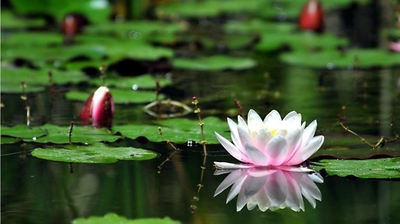By Blair McKissock, MSEd, RYT
There is so much violence and hate in the news of late. Life seems to be growing more tumultuous by the moment, so that it can be hard to make the effort to think. My goal over the past few years has been to open myself up to listen to the horses, and the natural world around me. Nature has a lesson to teach us, yet we are so disconnected from it that we have cut ourselves off from the greatest source of wisdom available to us. Finding peace isn’t about getting rid of fear, or isolating ourselves from hardship. We cannot have light without dark, life without death, and we cannot know peace without strife. It is about finding balance, which is a lesson we can learn from nature.
When I look at a herd of horses, I tend to look at them from a behavioral point of view. I have been seeing them from the bigger picture; seeing how the earth supports them, how the clouds and trees shade them, how the trees provide the fruit they eat, and how the soil provides the mud they roll around in. They roll in the mud to protect them from the flies, that lay their eggs on their manure, and the larvae that composts the manure, which feeds the soil, that grows the grass they eat. It is all connected and in balance.
This is some of what we can learn from the horses:
Connection- Horses have a sense of connectedness within their herd, and will fight to protect their members. After a stressful event, they touch one another and reconnect. Humans focus on our disconnections and differences. We are all a part of the same human herd, yet we do not connect. It is hard to be violent to another when we have connected with them.
Sustainability- Horses and many other species move constantly. They migrate in one direction and as they move out, the land left behind can recover for when they move through again. We consume until we have almost depleted our resources, making us compete for those few resources. If we live in balance as nature does, only using what we need, then we have a greater chance of being sustainable, and promoting cooperation instead of competition.
Compassion- All of nature demonstrates compassion within the harsh realities of finding balance. Within the act of balancing there is death, famine, and strife. It is in those moments that nature ends suffering through death. One dies so that the others can live. This is an example of compassion. It sounds counterintuitive, yet there would be no compassion if we did not know struggle. It is in the expression of compassion for another’s struggle that we begin to cultivate gratitude, empathy, tolerance, cooperation, and true charity.
Cooperation- Cooperation is a true key to finding peace. All of nature cooperates with each other; in a herd of horses, they each have a job to do, and cooperate to accomplish the goals of the herd; finding food and water, procreating, and protection. We don’t always cooperate with each other, which contributes to the tension building in our world. That tension, just like any other energy left unchecked, will escalate until it explodes. It is through cooperation with each other that problems will be solved, and lasting peace can be accomplished. Cooperation leads to the sharing of ideas and innovation.
Leadership- Every herd needs a stallion, just like every wolf pack needs an alpha. A true leader does not take sides, but acts in the best interest of the herd. A true leader knows when to cooperate, when to stand their ground, and how to listen to the voices of the herd, keeping the group working together as a community.
Find inner calm in a world of outer chaos- No matter the ingredients that make the perfect formula for peace, we know that it begins with us. Each of us can begin to cultivate peace inside through breath work, meditation, acts of kindness and compassion. This also means opening ourselves up to the harsh realities of our world, and the necessity of giving energy toward change. We must also open ourselves up to the neutralizing force of reconciliation, by letting go of long-held ideas that fall on the extreme end of the spectrum, and allowing ourselves to come more toward the middle. It doesn’t mean letting go of our beliefs and our faith, however, it does mean examining the assumptions and stories we have created over generations, to see if they are truthful, or just something someone said was true.
Blair McKissock, MSEd, RYT is a speaker and author on experiential and nature-based learning. You can learn more about coaching, OmHorse mounted yoga sessions, and the HorseWork Professional certificate training at: stridestosuccess.org.
 Conscious Community Magazine Dedicated to Elevating Consciousness
Conscious Community Magazine Dedicated to Elevating Consciousness





